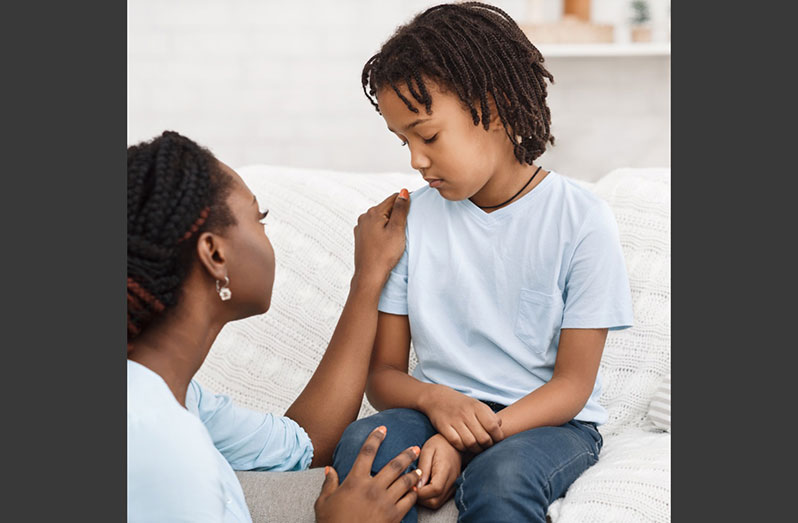PARENTING in Guyana often enforces an “obedience over everything” mantra. Children are taught to obey their parents under almost every circumstance. The idea of obedience is a common disciplinary practice in Guyana and the Caribbean, I do not agree with the usage of this to an extent, but that’s another article for another day. Obedience often entails many things, inclusive of apologising when necessary. While children have to apologise and hold themselves accountable for their actions—even though they are minors with a developing mind and personality, parents aren’t held to that same degree of accountability. Most of the time, parents are afraid to be honest with their children that they are human beings who can also make mistakes. In a sense, they are afraid to be vulnerable and admit their faults. To be truthful, holding oneself accountable is already a tedious thing to do. It is even more tedious when we have pride and arrogance at heart. Hence, it is difficult sometimes for parents to apologise and hold themselves accountable, especially as it relates to their children. There was actually a viral meme that said, “Caribbean mothers never apologise, they just start acting nicely to you”. There is humour in this, but there is also an underlying issue that is deeply rooted in parenting styles in Guyana and the Caribbean.
 Some Guyanese parents believe in exhibiting the hierarchy of a child-parent relationship. In their eyes, they hold “power” over their children and as such, they must act accordingly, i.e with authority. That’s a common mistake often made because they fail to understand that an apologetic parent allows for better communication and will give children a more realistic outlook to life in general. Refusing to apologise and admit fault says a lot about the respect you have for your child—dare I say, lack of. In some Guyanese households, children are forced to grow up without ever receiving an apology from their parents. We fail to realise that these misinformed, emotionally neglected children will grow up to become adults one day. Those very children will grow up believing that an apology isn’t necessary when they’re wronged. Some of these children will even start modelling the behaviours and actions of their parents. They will reuse those very toxic parenting skills with their children, because that is how they were conditioned to think.
Some Guyanese parents believe in exhibiting the hierarchy of a child-parent relationship. In their eyes, they hold “power” over their children and as such, they must act accordingly, i.e with authority. That’s a common mistake often made because they fail to understand that an apologetic parent allows for better communication and will give children a more realistic outlook to life in general. Refusing to apologise and admit fault says a lot about the respect you have for your child—dare I say, lack of. In some Guyanese households, children are forced to grow up without ever receiving an apology from their parents. We fail to realise that these misinformed, emotionally neglected children will grow up to become adults one day. Those very children will grow up believing that an apology isn’t necessary when they’re wronged. Some of these children will even start modelling the behaviours and actions of their parents. They will reuse those very toxic parenting skills with their children, because that is how they were conditioned to think.
An “apology” in this article goes beyond just saying, “I’m sorry.” Some people simply say, “I’m sorry” and they believe that’s the end of giving an apology. Apologies should be sincere and should allow for a positive reconnection in parenting. Apologies can come in many forms—changed behaviour, learning new parenting styles, holding oneself accountable, being honest about your mistakes to your child, openly apologising and creating dialogue when you are in the wrong. You validate your child’s feelings and emotions when you apologise and admit faults. When you gloss your flaws over, you fail to acknowledge and understand that your actions hurt or harm your child. You probably yelled at your child, broke their toy or hurt their feelings by telling them you don’t like watching their favourite TV show. No matter how big, small, symbolic or insignificant your mistake may be—it merits an apology. It teaches children from an early age to take responsibility for their actions, especially when it has negatively affected someone. In Guyana, many parents took the “easier” route of trying to keep their guards up by showcasing “perfect” human characteristics. In an ideal world, humans probably don’t need to apologise and take responsibility, but we shouldn’t force children to live in a world that doesn’t exist. If you’re a parent reading this, I urge you to come up with an effective and appropriate way to apologise to your child the next time you hurt their feelings, instead of finding an excuse or lying to them. Guyanese parents ought to stop holding onto the “power” they have in the relationship and start holding themselves accountable. We, as a society, need to stop reintroducing these outdated and primate parenting styles and habits in the name of culture and traditions. I hope as new, expecting, prospective or existing parents, we educate ourselves and internalise what an apology merits before we project our emotions onto developing fragile beings.




.jpg)









